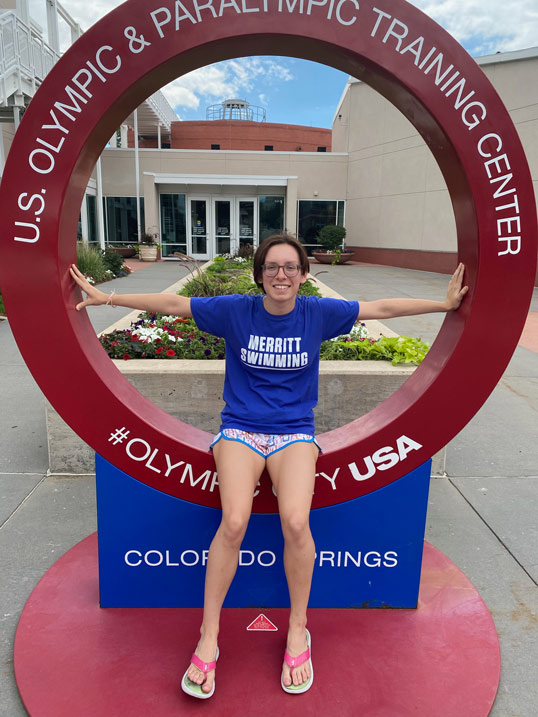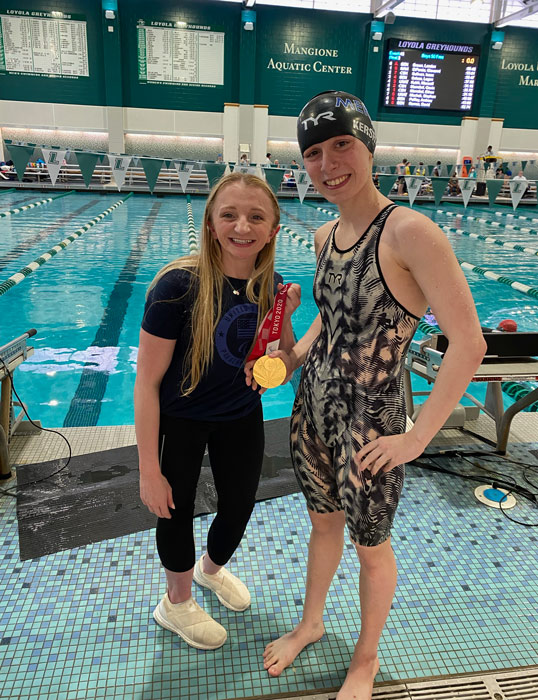The 17-year-old Maryland native hopes to one day compete as a swimmer in the Paralympic Games.

Success in sports isn’t always quantified by wins, trophies or medals. It can also act as a tool to teach
skills an athlete can use in all walks of life.
For 17-year-old Para swimmer Abby Kershaw, success is defined by an assurance that she can
accomplish whatever she sets her mind to. She can freely enjoy the thrill of being in the water with
others like her, building friendships and memories that will last a lifetime. The only boundaries are the
lanes in the pool.
Abby was born in Boston, but was placed in foster care when her birth parents discovered she had
Agenesis Corpus Callosum, a rare disorder that causes a partial or complete absence of an area of the
brain that connects the two cerebral hemispheres. ACC caused her to have visual and intellectual
impairments and borderline cerebral palsy.
After being put up for adoption, Abby caught the attention of Dale and Mary Kershaw. The couple
already had two boys, Jonathan and Christian, but wanted to adopt a girl. When they heard about
Abby’s condition, they spent a lot of time in prayer and doing research.
“We just got together and prayed,” Mary explained. “I told the (adoption agency) if the Lord wants me
to have a child with severe needs, he’ll equip me to take care of her. He has led me to take care of any
needs Abby does have.”
Dale and Mary brought their newly-adopted daughter home to Pasadena, Maryland, a suburb of
Baltimore. They placed her in an infants and toddlers program sanctioned by the state so she could
receive physical therapy. Speech and occupational therapy followed, and she was placed in a nursery
school for special needs children.
It wasn’t until Abby began attending a mainstream school that her vision problems became apparent.
She also experienced extreme bullying, and the teachers weren’t giving her the quality attention she
needed.
That’s when the couple decided to teach her at home. Mary had home-schooled their two sons, so
doing the same for Abby was a no-brainer.
“The teachers were just pushing her through,” Dale explained. “We didn’t want her to get less of an
education or experience that she deserves.”
Abby began to take swim lessons at a local swim school for small children. She participated in a mock
meet and did well enough that her parents decided to enroll her at the local YMCA where she began
competing. Abby did well, but she required assistance because of her limited vision. She had trouble
seeing the lines in the pool and required specialized goggles that were more expensive than regular
prescription ones. She was also not allowed to receive assistance to and from the pool.
Dale and Mary discovered Athletes Without Limits, a U.S. member of Virtus, the governing body for
athletes with intellectual impairments. Abby also participates in Para swim meets with hopes of
qualifying for the U.S. Paralympic National Team.
Para swimming has allowed Abby to gain confidence and a sense of belonging. She has received
encouragement from Paralympic swimmers Erin Popovich and McKenzie Coan. Popovich has 14 career
gold medals and set numerous world and Paralympic records. Coan, a three-time Paralympian and six-
time medalist, captured gold in the 400-meter freestyle at the Paralympic Games Tokyo 2020.
“When (Abby) steps on the block, she’s not leery or intimidated anymore,” Dale said. “I’ve seen a lot of
growth in her.”

Along with competing, Abby also enjoys the social interaction of the sport.
“I like the people,” she said. “They’re really nice. They just make me want to have fun.”
Last December, Abby competed in her first U.S. Para Nationals in Greensboro, North Carolina. She made
the finals in every race except one, placing third in the 200-meter freestyle with a time of 2:37.82.
“I was excited to be there,” Abby said. “I was super-fast in the pool. I met some good people there.”
While searching online for grants to fund Abby’s travel and other expenses, Mary discovered
Foreseeable Future Foundation. Dale filled out the application, and Abby was accepted as a grant
recipient several months later. The funds allowed her to participate in the Jimi Flowers Classic, a long
course event hosted in July by U.S. Paralympic Swimming at the Olympic Training Complex in Colorado
Springs.
“That was definitely a boost for us,” Dale said of the grant. “It was all fairly streamlined. It was a nice
thing to receive.”
When she isn’t in the water, Abby enjoys drawing, painting and playing video games. She hopes to
eventually earn enough emerging cut times to qualify for the U.S. National Team.
During the Tokyo Paralympics, Abby and her parents watched commercials featuring Para swimmer
Jessica Long, who was adopted from a Russian orphanage. Long went on to capture a total of 29 medals
over five Paralympic appearances. Long’s story bears a striking resemblance to Abby’s experiences.
“It was pretty inspiring,” Dale said. “I would like to see something like that for Abby so she can inspire
others.”
Mary would like swimming and other Paralympic sports to gain more awareness from the able-bodied
public.
“Some people don’t know that (Para sports) are out there for visually impaired athletes, intellectually
impaired athletes. Most people think it’s just for those in a wheelchair. We need to get this information
out there because people don’t know there’s a place kids can go.”
